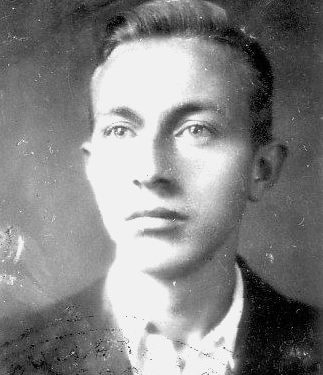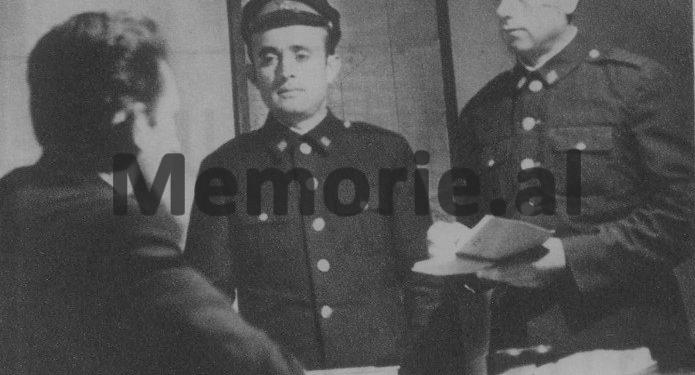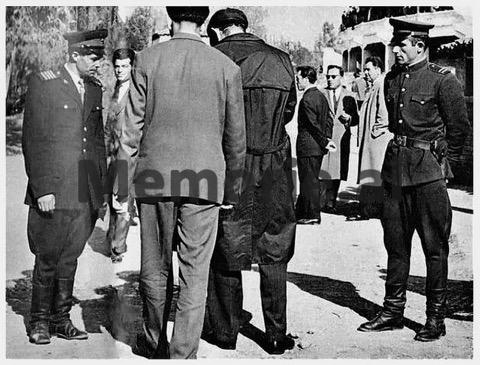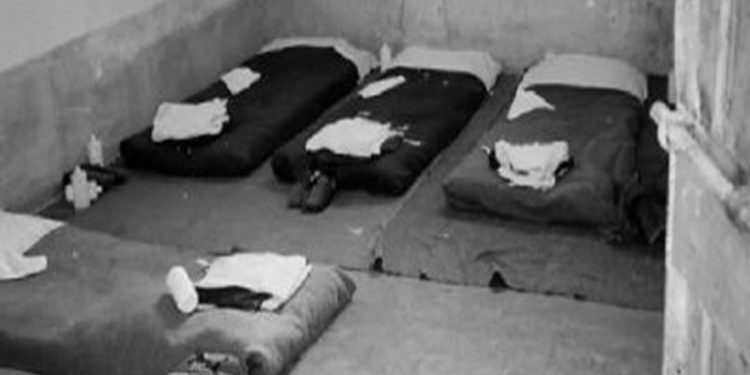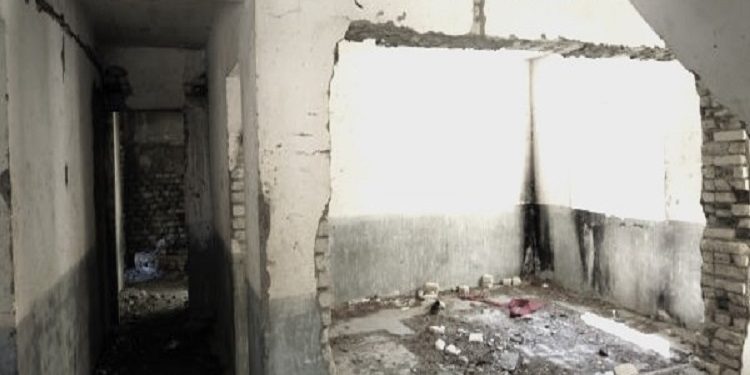By Uran Kalakulla
Part Twelve
Nazism and Communism
Memorie.al / Nazism lasted 12 years, while Stalinism lasted twice as long. In addition to many common characteristics, there are many differences between them. The hypocrisy and demagogy of Stalinism was of a more subtle nature, which was not based on a program that was openly barbaric, like Hitler’s, but on a socialist, progressive, scientific and popular ideology, in the eyes of the workers; an ideology that was like a convenient and comfortable curtain to lie to the working class, to lull the sharpness of intellectuals and rivals in the struggle for power.
One of the consequences of this peculiarity of Stalinism is that the entire Soviet people, its best, most capable, hardworking and honest representatives, suffered the most terrible blow. At least 10-15 million Soviets lost their lives in the torture chambers of the KGB, martyred or executed, as well as in the camps of the Gulag and others like them, camps where it was forbidden to correspond (in fact they were prototypes of the Nazi death camps); in the mines in the ice of Norilsk and Vorkuta, where people died from cold, from hunger, from crushing work in countless construction sites, in the exploitation of forests, in the opening of canals and during transportation in lead-lined wagons, or in the flooded barns of the death ships.
Continued from the previous issue
Pride? No, not at all. But a logical concern, an accurate calculation of the further progress of our investigative and judicial process. I do not believe that in this intuitive process, a sense of heroism could find a place. Even in people who were born brave and tested in real war battles. Moreover, such heroism, it seems to me, exists only in poetry, in literary prose, on cinematographic screens, that is, in an imaginary, pretended, unreal world. I wish I were wrong in this regard! Because, I believe, no one likes to lower their own head under the butcher’s knife, not even cattle! The grip on life is much stronger than the feeling of romantic heroism. And I am convinced that fear exists, despite the fact that, in a serious person, it is suppressed by another, more powerful feeling, by the feeling called dignity!
Among the Mice and the Bay Mice
While writing the title of this part of the book, I don’t know why I remembered, as a kind of association of ideas, the title of a well-known novel by the great American writer of the first half of the 20th century, John Steinbeck, a novel quite different from the more famous ones like “The Battle”, “The Fury”, etc. This novel with the title “Of Mice and Men” is, in my opinion, a work with an ideological mixture between existentialism and surrealism. Thus, between this chapter of mine and the Steinbeckian novel, there is only a kind of approximate sound, but nothing essential, ideological. Because my scenes, in this type of story, are completely real, even though the sarcasm in them is completely inevitable, in the end, as in the very essence of this book, for the very task that such a work has.
When I remember the time spent in the dungeons of Koç, another literary duality arises in my mind: that of the satirical poem of Hellenic antiquity entitled “Batrakomiomahia”, which in Albanian means “war between rats and frogs”, but in my case, here we do not have a war, but a kind of socialization between rats and captors, a kind of, not only coexistence, but also camaraderie, in an open, declared opposition to us, the forced inhabitants of the dungeons. It is true that from time to time, even between two “camaraderie”, a spectacular match took place in the dungeon corridor, between two service captors and a team of “friends of the bay”. But, there were never any casualties. It was more of a friendly, sporting match. The players, wearing knee-high boots, pretended to chase the uninvited visitors of the long corridor.
The latter, running around the bootstraps’ feet, were the captors, then, who jumped up, some out of fear and some out of joy, braying like donkeys. In a word, it was a kind of spectacle, according to a directorial scheme: two pairs of actors with similar roles, supposedly enemies among themselves, who fought for life or death, but who, in reality, were inseparable friends and comrades, since most of the time they spent in common company.
And both sides and this is the main thing, were determined enemies only against us, the forced inhabitants of the dungeons, fighting us consistently, each in his own way. But, even in this common “class war”, the rats of the bay and the captors of the dungeon service, had another front, where both sides competed to see who was the most diligent. And this was the war on the economic front, that is, to wash away even the few foods that we had left out of our misery in the hallway, on top of the piles of our sleeping clothes.
The rats preferred biscuits (bread, of course), cheese, especially that cheese, a piece of pie. The captors did not touch the bread, but the biscuits, the cheese and especially if they found it in their searches, a little honey or jam, yes. And cigarettes? And especially cigarettes. And the theft of matches was something legalized, because they let the matches in until there and then, when they disappeared, without a trace, and the cigarettes, the guards would light them for us at the prison counter, with a kind of rag wick that smelled or, guard Jonuzi with his lighter, telling us about it every time he came to light it for us: that he had bought the lighter for so much money, that the stone he had changed made so much, that he could barely find gasoline and, I don’t know how many other such stories.
The head of the prison, the one who took us and took us to the investigator, was called Rustem. He was from the village of Kërçukje in Ndroq. I have never seen anyone who resembled a chimpanzee more than he did. Even when he walked, dragging his legs, he looked exactly like a monkey. But I never saw him without a cigarette, either on his finger or in his mouth. And he smoked one of the most expensive cigarettes of the time: “Lux-blu”. I had heard, eavesdropping on his conversations with his friends that he had a bunch of scoundrels, his wife was unemployed, and so he only had one salary. How did he manage to smoke those kinds of cigarettes, lighting and extinguishing, who knows how many packs a day? Unless he gave the scoundrels grass, he himself only ate tobacco!
This Rustemi seemed wise. I never heard him shout. Was it because he was tired, already, or because he couldn’t keep up with his weakened physique? Or maybe he didn’t need much time to retire and he was saying to himself, in his Tirana dialect, “we’re going to be fine” now? But, perhaps, also because he made the other paloshës, as his subordinates, shout, threaten and grab the hur and he himself threw the stone and hid his hand? How do you know?
These others, as far as I remember, were: Hasan i tëtë (as I called him), Hasan Shuli, Ramazan (another Tirana villager), Garip “tokmaku” (because he was exactly like tokmaku), who was a real dog, with a beastly spirit. There was also Remzi Skënderi, a cigar lab, a bit tall and a bit thin, smart and cunning, so that when he got his hands on you, it was like the plague. There was Jonuzi i çakmaku, whom I “had the honor” to introduce a little earlier. There was also Velo škrravina (as the people of Shkodra call him) because you didn’t know where to cry before. Of course, there were others, but who the hell remembers all the bad guys with whom we had trouble?
I will suffice to describe only two of this gallery of captors: Galo (alias Garipin) and comrade Velo. If I am not mistaken, Galo was from Cologne, at least from what I understood from his speech and selected folk songs. His body was like a sack of shit, which moved on a pair of short legs, like those of cartoon dwarfs or, better, like the legs of a hedgehog that, except when they go out into the street, runs at a speed that amazes you. And his head was like those round pumpkins, for pie. He also had a black soul, like a cuss’s ass. Galo, as soon as he found a reason, would take pleasure in taking your soul, with a rage and ferocity, as if you had made his mother.
On Sundays, when the investigator usually had no work, Galo would take up the song with a drag that would make you vomit bile. Where would he find some ugly songs, oh my God, or would he make them ugly himself, because maybe the songs themselves weren’t like that. And not a little, but most of his eight-hour shift, he would spend singing or shouting, like a jackal’s scream, when a dungeon door knocked, because the one who was locked inside had a great deal of trouble getting to the toilet. Galoja would be touched by his own cuteness and, then, woe to the one who knocked on the door, because everything would take him away! I have never seen a “tenor” who would get as furious as Galoja, when they were waiting for the burst of his song.
One Sunday afternoon, a neighbor of mine in the dungeon had also taken up the song, just as easily, it seems inspired by Garip, with a kind of refrain that seemed Greek to me: “kajmeni, kajmeni”. Galoja spotted him, opened the door, put on the German handcuffs and shook and shook until the caiman bellowed like a cow, while Garipi was laughing to himself, with pleasure. If Garipi had heels and the investigators gave him orders, oh what that cruel little rascal would do, more savage than the wild boar itself!
And Veloja was exactly like those scarecrows in the gardens, when the wind of the field distorts and distorts them, even more than they themselves are. Yes, Veloja was exactly a kind of “scribble creature”. Veloja was a lab, but I am convinced that he was more a product of the Labëria ghouls, just like Remzi and his other friends. If Garipi was mean-spirited, at least he seemed to have some cunning, like the beasts of the forest. And Veloja was also stupid. And there is nothing more evil than a dog-hearted fool. Because it bites you everywhere, at all times, for no reason. So you don’t know how, from where, and when to protect yourself from it.
Yes, Veloja was a complete mess: in body, in face, in mind, in soul, and even in voice. It was as if God had badly distorted her, in every component of her. Thus, she had a crooked head, like those pumpkins that have no definite shape at all, with bulges exactly where they shouldn’t be. Her hair was like that wool of old hats, which, having been laid out for several generations at the foot of the hearth, have fallen out in places and their skin has become rough. But even where they could remain, they have become so tangled that there is no comb in the world that can comb them again. Even her scaly skin was like that of a corpse.
He had a triangular face, at first glance, but if you looked closely, you would notice that its outlines more resembled the irregularity of a spinach leaf, not the fresh, tender spinach, but the wilted spinach left unsold in the stalls of the matrapazes at the end of summer, half yellow and half chestnut, from rot. And, in the middle of this face, a pointed nose and that crooked one, oh my God. And under it a mouth that, in its outline, looked like that of an octopus, inside which there is a kind of foam that vomits it out from time to time, I don’t know why.
Here, this is how Velo’s saliva came out, when he supposedly started to speak, drooling like a gaggle that he was, to the point of making you sick, even risking getting you wet with his disgusting drops. And his eyes? Oh God! No one in the right place, no one on the same horizontal line, of that pseudo-face. Those eyes looked like those surrealist, or modernist, portraits, when one eye sees (as our people say), in Shan and the other in Baghdad. Apparently, they had started to turn blue, but had changed and taken on the color of cheese whey, with red outlines and looked exactly like the googly eyes, as the engravers of scary tales depict them.
Velo’s legs were like cartwheels that had come loose from their axles, each swaying at its own whim, leaving behind not straight lines, but various twists and turns. Another of Velo’s ugliness was that of being a stutterer: When he spoke, you had to have the patience to finally gather all the broken pieces of words, to be able to recreate the sentence in your mind and understand what the hell your “superior” wanted from you, in that damn place.
Once I caught sight of his master, looking through a thin crack in the lid of the door of my dungeon. He was sticking his fingers into my container, there on the shelf outside in the corridor. Where I had some honey, which my poor family had brought me. I couldn’t bear it and reported the thief to the last investigator, Vaska. Vaska had caught his attention and the thief had flung open the door and addressed me with all his anger, between drops of saliva and a quarter of his words:
– ““Pppssse pppeeer attto mutttrat e ttua kkkam mmmbetttur unu”?
I took the danger in my eyes and returned it in the same way:
– “Yes, it’s exactly for those mutts that you’ve been left, because I saw you I when you put your fingers in the bowl and licked them”! Velo got even more furious, but it seems that Vaska had ordered him not to push me away; he slammed the door shut, worse than he had opened it, and broke his neck there at the top of the long corridor. Thus, my hostility with Velo was “sanctioned by law”! Before this episode, another one had happened, not only with Velo, but with the Velo-Jonuz couple.
While I was waiting for my turn to go out need, I heard that, in the corridor, between the couple in question, a great “academic” debate had broken out, with a subject from administrative law. Jonuz “Çakmaku” said, that the hamlet is bigger than the village, even that a hamlet, includes several villages. While “Academic” Velo, defended the opposite thesis. Give and take and they could not find the word, so much so that there at the door of the prison, the discussion reached its peak. And, at that moment, I overheard Jonuzi telling Velo, if they should ask me. And it seems they had decided so. When I entered the dungeon, they held the door open and Jonuzi was the first to ask me:
– “More, we want to ask you something”.
– “Order, Mr. Capt”! – I said, holding back my breath with difficulty.
– “Were you a teacher?”
– “How do you order! – Do you know which is bigger, the village or the hamlet?
– “Where are you two from, I mean, from which region?”
– “What the f**k are you?” – Veloja intervened.
– “Well, if you don’t tell me where you are from, I can’t give you an answer!” – I replied. This time with determination.
They looked at each other for a moment and then Jonuzi was the first to speak:
– “I’m from Skrapar, and Veloja is from Labëria.”
– “Then, since you told me where you are from, I’ll tell you that from Shkumbini and below, they call it a village, and what goes above it, that is, from the north, they call it a hamlet. In a word, the village and the hamlet are the same thing”. They were both surprised and looked at each other, just like idiots. But the one who first gathered himself was exactly Velo who, blushing, turned to me angrily, with his usual stammer: -Ikkk oor ikk, because sss’dittke gjgigjë and you”!…
Thus spoke his master Velo and almost slammed the door in my face, closing it with force. But I did not leave him alone, because I burst out laughing, as I believe not only the two of them heard, but also my neighbors, near and far. But the work with Velo did not end there. He kept his anger at me until the end and, when I was sentenced (my life was spared and after that they left me in the dungeon again) or in the “death chamber”, for another two months), Velo found the opportunity when, on my way out of the dungeon, I had knocked on its threshold with my heel rather loudly and we got into a verbal argument. Now we convicts were not under the jurisdiction of the investigation, but of the prison command or, more precisely, under that of the Directorate of Prison Camps, of the Ministry of the Interior.
It was Sunday, a Sunday for me. If only they were separate Sundays or other days, that I spent there. Worried, it seems, by the tapping of my bare foot, he cursed me: “animal”. And I replied: “animal, it’s you and not me”. Veloja called the guard officer and he told him to handcuff me. Veloja wanted it so much. He turned my hands behind my back and put the handcuffs on me, which, when I was announced the pardon of my life, they had taken them off. So I didn’t have many days. And he squeezed them with the corner of the hood, until zero. He closed the door and broke my neck.
Who (among the prisoners) has tried the German handcuffs, or as we called them for short: “German women”. And there are not a few! I know very well what it means to tighten them to zero, that is, until their last drop. My hands would turn black and become like coal, from the complete lack of blood circulation in them. And this job was no joke! There was a risk of completely paralyzing those poor hands. Oh, how many people have had such a misfortune happen to them! My hands ached to the core, but I didn’t even flinch or say “oh”.
I gritted my teeth and endured, so that the dog Velo wouldn’t be pleased at all. The guard officer had only given permission to keep me handcuffed for two hours, but Velo left me like that for a full eight hours, his entire shift. The handcuffs were removed from me by the other captain, who replaced that dog. This is how Captain Velo rewarded me for my explanation; “on administrative law”!
When I left the dungeons for prison, one of the joys (he said joy) was that I would never see the face of that cruel scoundrel named Velo again! No matter where I went (through prisons and camps), I would find many other Velos, even blacker, but none of them was scoundrels like him!
The last trio of investigators
I had met Major Llambi Titani in Durrës, after two or three months, when they had not called me to be an investigator at all, as I have said before. When I met him, I noticed that physically, he was the complete opposite of the “corrosion gorilla”, Lieutenant Colonel Irakli Kocani. Llambi was from Korça, but it seemed that he had grown up, as the Albanian popular expression goes, “on the bread of the vakëfes”, meaning that he had been, since his earliest childhood, with a dry gut. Otherwise, how can you explain his short, stocky appearance?
He had a face (of course, like his body), like a leaf in autumn: half yellow and half green. He had two mournful eyes, always somewhat watery, as if he had just stopped weeping; with red eyelids, like those of an alcoholic, always with scabs (like a frame of pus) around them, and a glow that did not have the brightness of life, but that of the reflection of clear autumn nights, in the graves. His neck, wrinkled from the cold, looked more like one of those leather bags of the highlanders, where they keep tobacco, flint, mace and ash.
But what struck me most about that face, besides the eyebrowless eyes, was his mouth, which resembled a wound (also festering), from which protruded some long horse teeth, yellow as the color of his face. Llambi’s voice was something between that of a skunk and a woman, rarely with any clear masculine nuance, in his obvious Korça dialect. And, as if to complete the defective framework of his being, on his forehead he had a kind of bang, in yellow, that more resembled a pumpkin flower and, in most cases, aroused disgust.
To complete this ugliness, he dressed well: in expensive clothes, rare for that time, with a large fur coat around his neck, but I also had a complex about his physique and clothing, because he reminded me (add to this the task he performed), of that predatory, neckless bird that, if I’m not mistaken, lives somewhere in the Andes. Another inconsistency existed in his being. And this was his surname, Titan.
The Titans, these mythological beings of antiquity, were of gigantic proportions, and Llambi was a sight to behold. But from the inside, that is, from the soul? And what can I say about that? Wasn’t he a Sigurimi officer, for who knows how many years? Isn’t this fact enough? And, as for the mental side, it was enough to see his writing, his calligraphy, and then you would be convinced that he had not much, that he had completed the partisan illiteracy course.
Llambi did not scream, did not curse, much less did he strike. Have you ever seen a snake make a noise? In the family of these snakes, only the “Python”, a large snake, I have heard of hitting its victim hard with its fangs. But the Llambi was not a “Python”. He was more or less a viper or a rattlesnake. The next investigator who followed Llambi was a first captain, who always dressed in civilian clothes, but badly, like a scoundrel. They called him Vangjel Kote, from the South, but I don’t know from which side. Memorie.al




